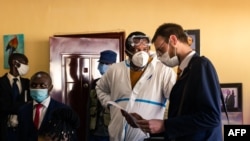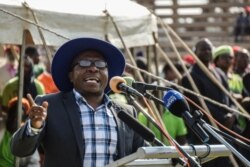The Office of the U.N. High Commissioner for Human Rights says it is "concerned" that authorities in Zimbabwe may be using the COVID-19 pandemic as a pretext to clamp down on citizens’ freedoms. This week, police arrested a prominent investigative journalist and an opposition leader, accusing them of inciting public violence.
Journalist Hopewell Chin'ono and politician Jacob Ngarivhume have been jailed since Monday on allegations of inciting public violence -- through social media -- ahead of a planned July 31 government corruption protest. Both men have denied the charges.
In Geneva Friday, OHCHR spokesperson Liz Throssell said Zimbabweans have a right to protest corruption or anything else.
“Merely calling for a peaceful protest or participating in a peaceful protest are an exercise of recognized human rights," said Throssell. "We are also concerned at reports of police using force to disperse and arrest nurses and health workers for infringing lockdown restrictions as they were trying to protest for better salaries and conditions of work... While recognizing the government’s efforts to contain the pandemic, it is important to remind the authorities that any lockdown measures and restrictions should be necessary, proportionate and time-limited, and enforced humanely without resorting to unnecessary or excessive force.”
Late Friday, Chin’ono was denied bail by the Magistrate Courts, one day after the courts denied bail to Ngarivhume. Zimbabwe Lawyers for Human Rights said it would appeal the rulings to the High Court next week.
Earlier in the week, bail hearings for Chin'ono and Ngarivhume were cut short on two consecutive days. Officials said they wanted to leave early to ensure they comply with a dusk-to-dawn curfew imposed in Harare Wednesday as part of new restrictions to contain COVID-19.
Beatrice Mtetwa of Zimbabwe Lawyers for Human Rights, who is representing Chin’ono, was not amused.
“We find this extremely frustrating because constitutional rights like the right to liberty have now been suspended through failure to make appropriate arrangements," said Mtetwa. "Surely, they should make arrangements such as bail to take staff home so that constitutionally guaranteed rights like liberty are not unnecessarily infringed. It’s extremely frustrating. It makes a mockery of the need to come to court within 48 hours. It makes a mockery of the requirement that bail (application) be heard urgently.”
Announcing the curfew, President Emmerson Mnangagwa said he was aware that some rights would be infringed upon. But Mtetwa is not convinced.
“If you want to make excuses for trampling on people’s rights, you are absolutely free to do so but it is not what the constitution provides for," said Mtetwa. "Bail matters are always heard on an urgent basis. You can sit right into the night as long as you make arrangements to take the court staff home. So it cannot be an excuse that the president has decreed. The president has no power to suspend constitutional rights.”
Getting into a waiting prison vehicle Friday, Chin’ono had this to say to waiting reporters.
“We are being persecuted for talking about corruption and we won’t be bowed. (Coco: “And your spirits?”) I am fine," said Chin’ono.
Nick Mangwana, the secretary of Zimbabwe’s ministry of information, did not answer phone calls from VOA.





